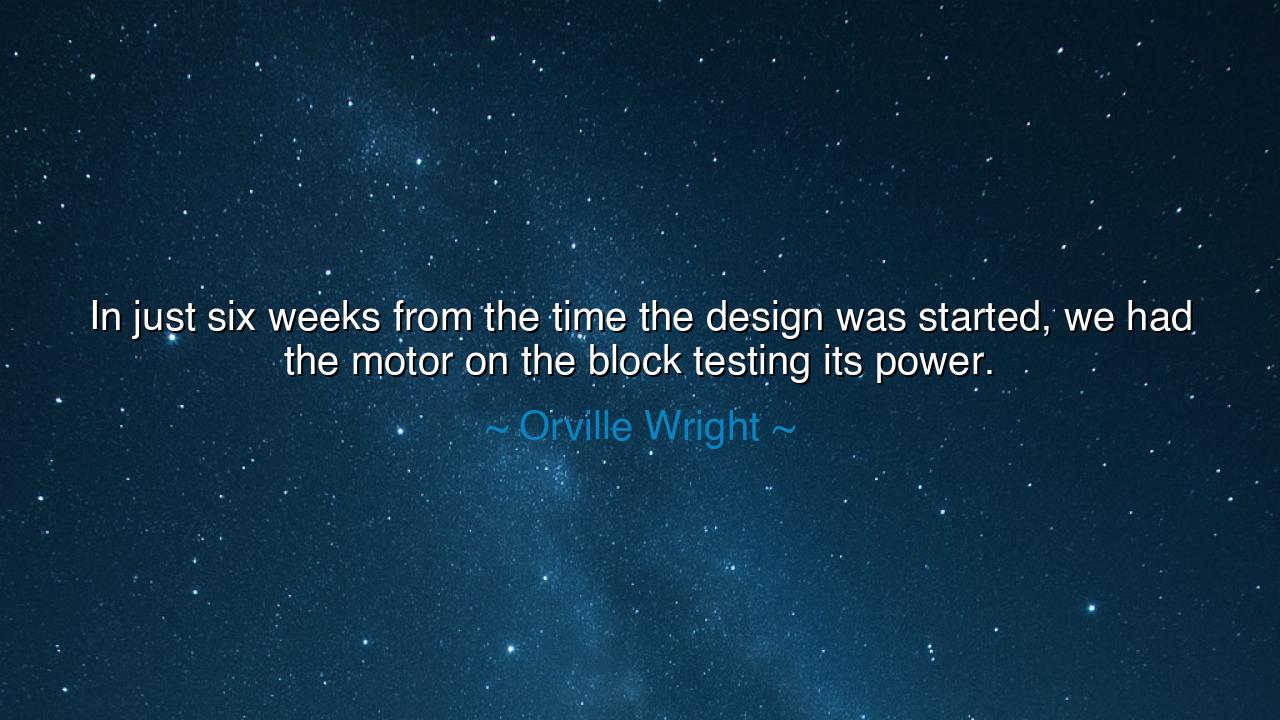
In just six weeks from the time the design was started, we had
In just six weeks from the time the design was started, we had the motor on the block testing its power.






Orville Wright, a man whose dreams defied gravity itself, once said: “In just six weeks from the time the design was started, we had the motor on the block testing its power.” These words, humble in their simplicity, conceal the thunder of an age-defining triumph. Within them lies a lesson in determination, discipline, and the divine urgency of creation. For in that brief span of six weeks, two brothers transformed imagination into motion, and the dream of flight — ancient as Icarus — took its first breath of reality.
In the dawn of the twentieth century, when humanity still trudged upon the earth and dared only to envy the birds, Orville and Wilbur Wright turned their workshop in Dayton, Ohio, into a temple of invention. They had neither fortune nor formal education in engineering; what they possessed was faith in effort, the belief that with their own hands they could build the impossible. The quote captures that sacred moment when vision met execution, when ideas ceased to be clouds of thought and became the humming of a motor, alive and real. Their six weeks were not merely days of labor — they were days of destiny, compressed into the rhythm of creation itself.
The meaning of Orville’s words extends far beyond the mechanics of invention. They speak to the power of focused action, of devoting one’s mind and spirit wholly to a purpose. Too often, men linger in the realm of planning and doubt, waiting for perfect conditions that never arrive. But the Wrights did not wait for permission from the world; they built their wings and tested them against the wind. Their speed was not born from haste, but from clarity — that rare alignment of will and purpose where every waking hour is a step toward the inevitable. In their workshop, time itself bowed to conviction.
History offers many such moments, when humanity, through sheer persistence, compressed eternity into a handful of days. Think of Michelangelo, who in just four years painted the Sistine Chapel’s ceiling — not because he was rushed, but because he was driven by a vision so powerful that rest became impossible. Or recall Alexander the Great, who in his youth conquered worlds because he refused to waste a single sunrise on hesitation. The Wright brothers belong to this lineage of souls who understand that creation is not measured by time, but by intensity of devotion.
The origin of Orville’s quote lies in his recounting of their early struggles to design a lightweight engine for their flying machine. No existing motor could serve their purpose; so they built one themselves, forging new metals, crafting new designs, and testing until the earth itself yielded to their persistence. Six weeks — a span that for most men would barely suffice for sketches and theories — was enough for them to manifest innovation. And when that motor roared to life, it did not merely turn a propeller; it announced to the universe that mankind would no longer be bound to the ground.
But beneath this tale of invention lies a greater truth: that speed without purpose is folly, yet purpose infused with urgency becomes creation’s heartbeat. The Wrights were not reckless — they were resolute. They knew that hesitation was the enemy of progress, that each delay was another day in which the dream of flight might die unborn. So they moved, not with haste, but with holy intent. Every bolt turned, every test conducted, carried the weight of belief. When Orville said they had the motor “testing its power,” he was not speaking only of the machine — he was speaking of the human spirit testing its own strength.
Learn, then, from these words, O seeker of greatness. Do not measure your work by the length of time it takes, but by the depth of your commitment within that time. Six weeks of unwavering effort can achieve more than six years of wandering thought. When your purpose burns clear and bright, the universe will conspire to shorten your path. But you must dare, as the Wrights did, to build while others doubt, to act while others talk, to trust the rhythm of your own creation.
And when the day comes that your engine roars — whatever form that engine takes — let it remind you that greatness is not born from waiting, but from working. The sky did not open itself to the Wright brothers because they wished it to. It opened because they labored, they believed, and they refused to stop. So too must you take your six weeks — your moment of purpose — and let the fire of your will transform your dream into something that can lift from the earth and touch the heavens.






AAdministratorAdministrator
Welcome, honored guests. Please leave a comment, we will respond soon